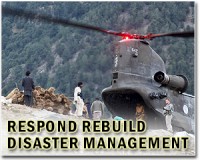| . |  |
. |
Atlanta (UPI) Jan 31, 2011 Monsoons that brought flooding to Pakistan last July could have been predicted days in advance if data from computer models had been processed, researchers say. Five days before the rains began, computer models at a European weather-forecasting center were giving indications downpours were imminent, an American Geophysical Union release said Monday. The July floods killed thousands of people and disrupted the lives of an estimated 20 million people. A retroactive study of the raw model data found that if the information had been processed, forecasters could have predicted extremely accurate rainfall totals 8-10 days beforehand. The floods themselves could have been predicted if the data from the European Center for Medium-Range Weather Forecasting had been processed and fed into a hydrological model which takes terrain into account, researchers say. "People don't understand the powers of modern environmental prediction," says Peter Webster, a professor of earth and atmospheric science at the Georgia Institute of Technology in Atlanta. "This disaster could have been minimized and even the flooding could have been minimized." The weather center, a London-based organization of 33 participating European countries, "does not give out weather forecasts and weather warnings to the general public or media," center scientist Anna Ghelli says. "ECMWF provides numerical forecasts to its member and co-operating states and they are responsible to prepare forecasts for the public and advise the authorities in their own countries. "We noticed that the signal was there five days in advance, but the lack of a cooperating agreement between the forecasting center and Pakistan meant warnings didn't make it to the Pakistani people or Pakistan's own meteorological agency. Processing raw data into weather forecasts and combining them with hydrological models is only half the work, Webster says. To have any effect, resulting flood forecasts must be successfully disseminated to authorities," he says.
earlier related report A Purdue University professor of chemical engineering says a cross-disciplinary approach is needed involving public policy experts so that scientific and engineering lessons learned from major disasters like the BP Deepwater Horizon spill or the 1984 Union Carbide chemical accident in Bhopal, India, which killed more than 2,000, get translated into effective policies and regulations, a university release said Monday. "The striking similarities in such catastrophes necessitates a broader perspective to better understand such failures," Venkat Venkatasubramanian says. "In the history of systemic failures, a few disasters have served as wake-up calls." As examples Venkatasubramanian cites the Flixborough chemical plant explosion in Britain in 1974 that killed 26 people, and the 1988 failure of an oil platform in the North Sea, which led to in 167 deaths and about $2 billion in losses. "Such systemic failures are not limited to the chemical and petrochemical industries," he says. "Typically, systemic failures occur due to fragility in complex systems," Venkatasubramanian says. "Modern technological advances are creating a rapidly increasing number of complex engineered systems, processes and products, which pose considerable challenges in ensuring their proper design, analysis, control, safety and management for successful operation over their life cycles." The scale and complexity of interactions between elements, including people, in such systems-of-systems make them fragile, he says. Investigations have shown that major disasters rarely occur due to a single failure of equipment or personnel. Instead, layers of failures of equipment, systems, processes, regulations and people usually are at fault, he says.
Share This Article With Planet Earth
Related Links Bringing Order To A World Of Disasters A world of storm and tempest When the Earth Quakes
 Australia flags taxpayer levy for floods
Australia flags taxpayer levy for floodsSydney (AFP) Jan 21, 2011 Australian Prime Minister Julia Gillard Friday raised the prospect of a one-off tax to pay for rebuilding after epic floods, as rising waters prompted more evacuations in the southeast. Crops, roads and railway lines were washed away and thousands of homes destroyed by vast floods that swamped Queensland state this month in what the government has said could be the nation's most costly natur ... read more |
|
| The content herein, unless otherwise known to be public domain, are Copyright 1995-2010 - SpaceDaily. AFP and UPI Wire Stories are copyright Agence France-Presse and United Press International. ESA Portal Reports are copyright European Space Agency. All NASA sourced material is public domain. Additional copyrights may apply in whole or part to other bona fide parties. Advertising does not imply endorsement,agreement or approval of any opinions, statements or information provided by SpaceDaily on any Web page published or hosted by SpaceDaily. Privacy Statement |